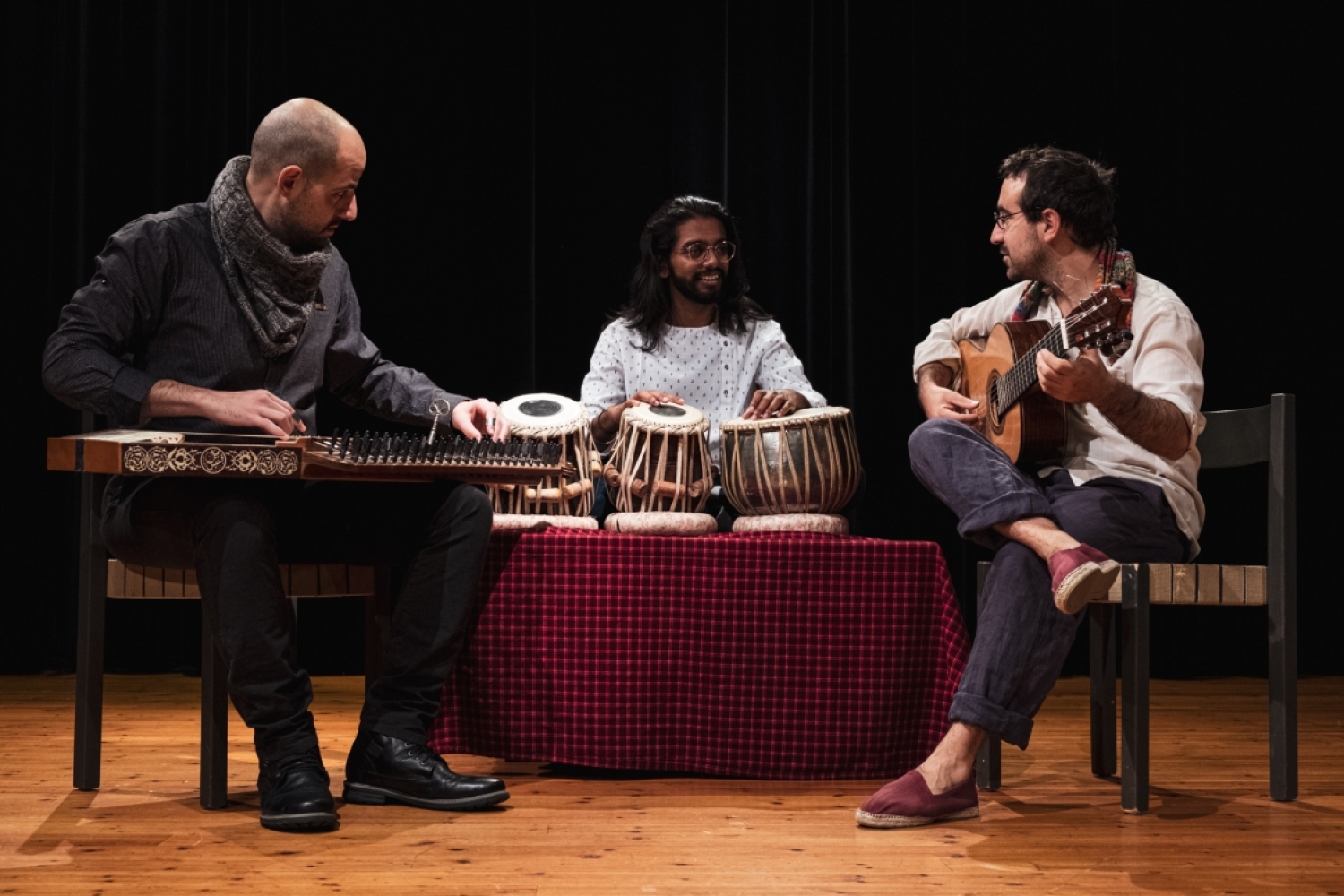

Aayaam was born when a tabla player from India, a guitarist from Spain, and a qanun player from Palestine connected with each other through the uniqueness of their idenity and instruments. The name, meaning dimensions in Hindi, aptly captures the essence of the group—coming together from diverse corners of the world. Having performed in Spain, they brought their talents to Delhi for the next leg of their tour. With plans to visit Palestine in the future hopefully, the trio aims to deepen their understanding of each other by exploring their respective birthplaces. In a conversation with Aayaam, we dive into their unique musical journey.
The Begginings of Aayaam
Prabhat, the Indian tabla player, went to Sweden on a scholarship to do his Master's degree and that's where he met the other two musicians. He tells us 'in college, we came to know about each other through our music. We instantly connected through our respective intruments and cultures. The Swedish culture is very different from the cultures that we three come from, so we found a lot of common ground in our upbringings.' Joan, the guitarist from Spain, adds, 'When you live abroad, you miss your own culture and all of us resonated with that feeling so I think there was a lot of commonality between how three of think and feel.'
Come Together from Diverse Backgrounds
'It's all about mutual respect for our traditions and understanding eachother as a person. We don't try to get into eachothers boundaries too much. I still play a lot of Indian classical music. Joan and Shafeeq are too playing the sounds of their roots. With our respective roots, we try to create a sound that's adds a unique depth to our music.', says Prabhat.
Exploring Each Other's Culture
'I mean, exploring various places with the trio has been truly transformative. Being in India itself is an enriching experience, and going to different countries adds a unique dimension to our lives. Sharing the intricacies of life in diverse places strengthens our bond. During the summer, we went to Catalonia, where we immersed ourselves in the beauty of the surroundings and played in Joan's village. Hopefully, one day, all three of us will have the opportunity to be together in Palestine as well.' says Prabhat. Shafeeq adds 'Also seeing eachother's cultures together, it really has helped me to appreciate my own culture. It expands our perception of music and expression. So for me, as someone with limited freedom of movement with my Palestinian passport and my background, being able to travel with Aayaam and sharing all our emotions has been a very important thing for my healing. We have differences but there are so many common things in terms of music, rituals, food, the way of living and everything.
Relationship with Music
'For me, music has always been my primary mode of self-expression', says Joan. 'In my childhood, it started as a hobby, almost like a game or a form of entertainment. As I grew older, it evolved into something deeper, eventually leading me to decide to pursue a career as a musician. What resonates most with me about music is its incredible ability to connect people. It possesses a unique social power.'
Prabhat discusses the challenges of pursuing a career in music in India, 'I am the sole musician in my family, and in India, where pursuing music as a career can be challenging, especially in a middle-class setting where expectations often lean towards more conventional professions like engineering. Despite the initial pressure, I made the bold choice to follow my passion, particularly in playing the tabla, which I began learning at the age of six. It wasn't until later in grade 11 or 12 that I expressed my desire to pursue music professionally to my parents. Navigating the competitive landscape of tabla players in India was daunting, I didn't want to be part of a constant competition. I decided to focus on my own artistic expression rather than getting caught up in the race. This decision led me to attend various world folk music camps, where I discovered a college offering master's education that allowed more freedom for personal projects. Being a tabla player, initially a shy person relegated to the background, I found my instrument to be a powerful voice to communicate my emotions.'
Shafeeq's position as a Palestinian adds another unique perspective to his music, he tells us, 'It's not easy to be a musician in our world at this moment. Growing up in Palestine, a place where people barely survive, choosing to be a musician meant constantly persuading those around me that I was pursuing my true passion. Prior to this, I worked as a banker and accountant while simultaneously engaging in music for a few years, striving to find a balance in both worlds. As I started releasing music, a profound connection with people began to emerge. The journey took me to Sweden, where I encountered numerous musicians. Beyond playing an instrument, music has become a means of truly connecting with the human beings I meet along the way. I chose the Qanun as my instrument during childhood, stemming from a love at first sight. While singing has always been a passion and an integral part of my expression, the Qanun has become a natural extension of who I am, shaping and defining my identity.'
Words Paridhi Badgotri
Date 16.01.2024